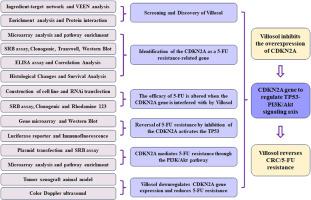当前位置:
X-MOL 学术
›
J. Ethnopharmacol.
›
论文详情
Our official English website, www.x-mol.net, welcomes your feedback! (Note: you will need to create a separate account there.)
Villosol reverses 5-FU resistance in colorectal cancer by inhibiting the CDKN2A gene regulated TP53-PI3K/Akt signaling axis
Journal of Ethnopharmacology ( IF 4.8 ) Pub Date : 2024-02-10 , DOI: 10.1016/j.jep.2024.117907 Han Chen , Jiao Deng , Tie-Wei Hou , Yong-Qi Shan
Journal of Ethnopharmacology ( IF 4.8 ) Pub Date : 2024-02-10 , DOI: 10.1016/j.jep.2024.117907 Han Chen , Jiao Deng , Tie-Wei Hou , Yong-Qi Shan

|
(Juss.) (PV) is the drug of choice in traditional Chinese medicine for the treatment of colorectal cancer (CRC) and has achieved reliable efficacy in clinic. Villosol is the active ingredient in PV. However, the molecular mechanism by which Villosol reverses chemoresistance in CRC remains unclear. Analysis of the molecular mechanism by which Villosol, the active ingredient of PV, reverses CRC/5-FU resistance through modulation of the gene was validated by network pharmacology techniques and experiments. We identified as a gene associated with 5-FU resistance through gene chip analysis. Next, we conducted a series of functional analyses in cell lines, animal samples, and xenograft models to investigate the role, clinical significance, and abnormal regulatory mechanisms of in 5-FU resistance in CRC. In addition, we screened and obtained a raw ingredient called Villosol, which targets , and investigated its pharmacological effects. Analysis of CRC cells and animal samples showed that the upregulation of expression was strongly associated with 5-FU resistance. CRC cells overexpressing showed reduced sensitivity to 5-FU and enhanced tumor biology in vitro. Inhibition of aberrant activation of enhances the expression of . Mechanistically, overexpression of activates the PI3K/Akt pathway and induces resistance to 5-FU. Villosol inhibited , and CRC/5-FU cells regained sensitivity to 5-FU. Villosol effectively reverses 5-FU resistance through the CDKN2A-TP53-PI3K/Akt axis. Changes in gene expression can be used to predict the response of CRC patients to 5-FU therapy. Additionally, inhibiting activation with Villosol may present a new approach to overcoming 5-FU resistance in clinical settings.
中文翻译:

Villosol 通过抑制 CDKN2A 基因调节的 TP53-PI3K/Akt 信号轴逆转结直肠癌的 5-FU 耐药性
(Juss.)(PV)是中药治疗结直肠癌(CRC)的首选药物,在临床上取得了可靠的疗效。 Villosol 是 PV 中的活性成分。然而,Villosol 逆转 CRC 化疗耐药的分子机制仍不清楚。通过网络药理学技术和实验验证了 PV 活性成分 Villosol 通过基因调节逆转 CRC/5-FU 耐药性的分子机制分析。我们通过基因芯片分析鉴定出与5-FU耐药性相关的基因。接下来,我们在细胞系、动物样本和异种移植模型中进行了一系列功能分析,以研究 5-FU 耐药在 CRC 中的作用、临床意义和异常调节机制。此外,我们还筛选并获得了针对 的原料成分Villosol,并研究了其药理作用。对 CRC 细胞和动物样本的分析表明,表达上调与 5-FU 耐药性密切相关。 CRC 细胞过度表达显示出对 5-FU 的敏感性降低并增强了体外肿瘤生物学。抑制异常激活可增强 的表达。从机制上讲,过表达会激活 PI3K/Akt 通路并诱导对 5-FU 的耐药性。 Villosol 抑制 ,CRC/5-FU 细胞恢复对 5-FU 的敏感性。 Villosol 通过 CDKN2A-TP53-PI3K/Akt 轴有效逆转 5-FU 耐药性。基因表达的变化可用于预测 CRC 患者对 5-FU 治疗的反应。此外,用 Villosol 抑制激活可能会提供一种克服临床环境中 5-FU 耐药性的新方法。
更新日期:2024-02-10
中文翻译:

Villosol 通过抑制 CDKN2A 基因调节的 TP53-PI3K/Akt 信号轴逆转结直肠癌的 5-FU 耐药性
(Juss.)(PV)是中药治疗结直肠癌(CRC)的首选药物,在临床上取得了可靠的疗效。 Villosol 是 PV 中的活性成分。然而,Villosol 逆转 CRC 化疗耐药的分子机制仍不清楚。通过网络药理学技术和实验验证了 PV 活性成分 Villosol 通过基因调节逆转 CRC/5-FU 耐药性的分子机制分析。我们通过基因芯片分析鉴定出与5-FU耐药性相关的基因。接下来,我们在细胞系、动物样本和异种移植模型中进行了一系列功能分析,以研究 5-FU 耐药在 CRC 中的作用、临床意义和异常调节机制。此外,我们还筛选并获得了针对 的原料成分Villosol,并研究了其药理作用。对 CRC 细胞和动物样本的分析表明,表达上调与 5-FU 耐药性密切相关。 CRC 细胞过度表达显示出对 5-FU 的敏感性降低并增强了体外肿瘤生物学。抑制异常激活可增强 的表达。从机制上讲,过表达会激活 PI3K/Akt 通路并诱导对 5-FU 的耐药性。 Villosol 抑制 ,CRC/5-FU 细胞恢复对 5-FU 的敏感性。 Villosol 通过 CDKN2A-TP53-PI3K/Akt 轴有效逆转 5-FU 耐药性。基因表达的变化可用于预测 CRC 患者对 5-FU 治疗的反应。此外,用 Villosol 抑制激活可能会提供一种克服临床环境中 5-FU 耐药性的新方法。







































 京公网安备 11010802027423号
京公网安备 11010802027423号